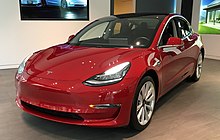An alternative fuel vehicle is a motor vehicle that runs on alternative fuel rather than traditional petroleum fuels (petrol or petrodiesel). The term also refers to any technology (e.g. electric cars, hybrid electric vehicles, solar-powered vehicles) powering an engine that does not solely involve petroleum.[citation needed] Because of a combination of factors, such as environmental and health concerns including climate change and air pollution, high oil-prices and the potential for peak oil, development of cleaner alternative fuels and advanced power systems for vehicles has become a high priority for many governments and vehicle manufacturers around the world.
Vehicle engines powered by gasoline/petrol first emerged in the 1860s and 1870s; they took until the 1930s to completely dominate the original "alternative" engines driven by steam (18th century), by gases (early 19th century), or by electricity (c. 1830s).
Hybrid electric vehicles such as the Toyota Prius are not actually alternative fuel vehicles, but through advanced technologies in the electric battery and motor/generator, they make a more efficient use of petroleum fuel.[2] Other research-and-development efforts in alternative forms of power focus on developing all-electric and fuel cell vehicles, and even on the stored energy of compressed air.
An environmental analysis of the impacts of various vehicle-fuels extends beyond just operating efficiency and emissions, especially if a technology comes into wide use. A life-cycle assessment of a vehicle involves production and post-use considerations. In general, the lifecycle greenhouse gas emissions of battery-electric vehicles are lower than emissions from hydrogen, PHEV, hybrid, compressed natural gas, gasoline, and diesel vehicles.[3]
- ^ Cobb, Jeff (2017-01-31). "Tesla Model S Is World's Best-Selling Plug-in Car For Second Year In A Row". HybridCars.com. Retrieved 2017-01-31. See also detailed 2016 sales and cumulative global sales in the two graphs.
- ^ "Revealed - how the hybrid car "works" | Claverton Group". Claverton-energy.com. 2009-02-24. Retrieved 2010-12-12.
- ^ Cite error: The named reference
:1was invoked but never defined (see the help page).


